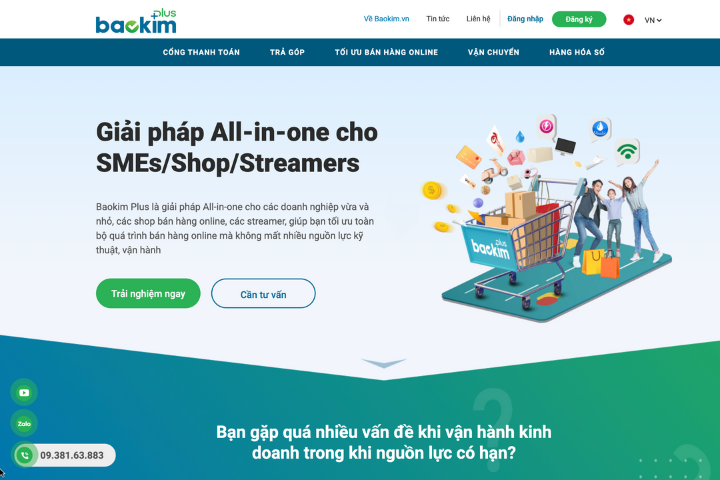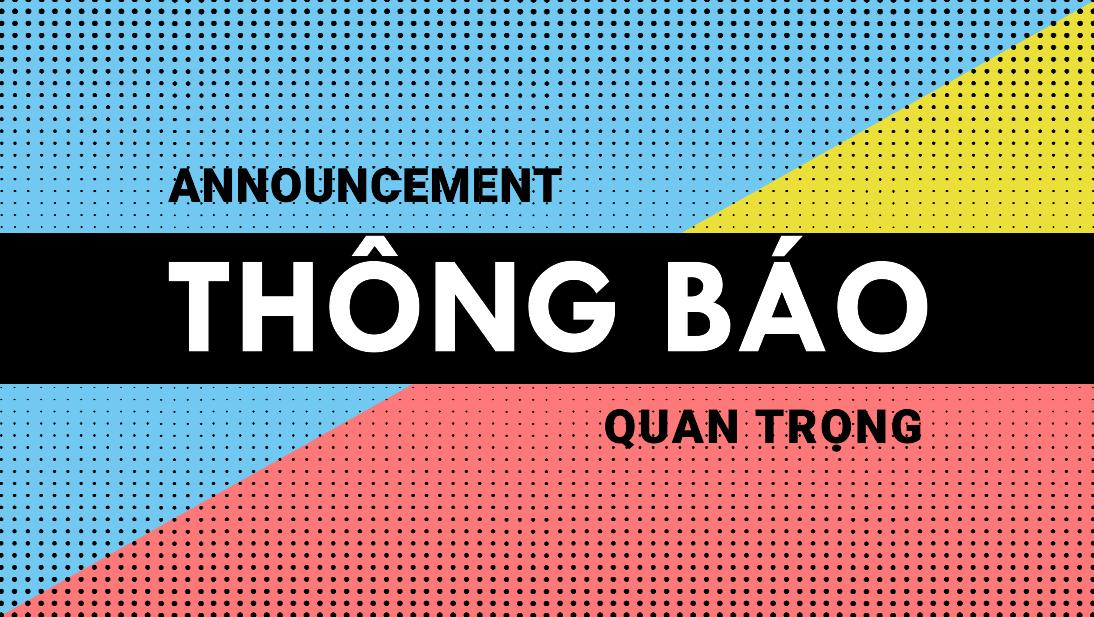TIN TỨC
Tin mới nhất
.png)
Baokim Plus - Tối ưu bán hàng online

17 ngày trước

2698 lượt xem
Baokim Plus tích hợp các chức năng quản trị vận hành bán hàng, và tiện ích mở rộng Quản lý ví điện tử Shop quản lý dễ dàng Lịch sử giao dịch, Số dư ví, Số tiền nạp/rút, giúp chủ động trong kế hoạch bán hàng. Quản lý đa chi nhánh Giúp Shop quản lý Chuỗi cửa hàng ở nhiều địa điểm khác nhau ngay trên 1 hệ thống. Đồng bộ kênh Mạng xã hội Giúp Shop thanh toán bằng mọi phương thức khi kinh doanh trên Mạng xã hội và quản lý mọi kênh bán hàng bằng một hệ thống thống nhất. Vận chuyển tự động Chỉ với 1 cú click, Shop có thể thông báo ngày hàng cần vận chuyển đến đơn vị vận chuyển đã được kết nối tự động, không cần tạo vận đơn, tiết kiệm thời gian. Tối ưu bán hàng online Quản lý toàn bộ Đơn hàng theo: Tình trạng đơn hàng, Khách mua, Thời gian, Tổng tiền, Phương thức thanh toán, … Tối ưu hoạt động mua hàng Shop có thể chọn mua Hàng hóa số theo sở thích và nhu cầu của Shop để tối ưu doanh số dựa trên nguồn lực có sẵn. Đồng bộ website và chatbot Đồng bộ Đơn hàng từ nhiều Website khác nhau để quản lý nhanh chóng, chính xác. Đồng thời, hệ thống Chatbot sẽ giúp Shop hỗ trợ Khách hàng tiện lợi hơn. Linh hoạt khuyến mãi Quản lý các Evoucher theo Mã, Chiến dịch, Thời gian, Giá trị voucher, Tình trạng sử dụng, ... rõ ràng, chính xác, giúp Shop nâng cao tỷ lệ mua hàng. Liên hệ để được tư vấn tại đây

Baokim Plus - Cổng thanh toán dành cho các merchant

21 ngày trước

2692 lượt xem
Doanh nghiệp nhỏ và các Merchant gặp rất nhiều khó khăn khi vận hành kinh doanh, đặc biệt trong hoàn cảnh giãn cách xã hội nhằm ngăn chặn sự lây lan của dịch bệnh. Có thể kể đến những khó khăn sau: Không có website, không có IT, chỉ có tài khoản mạng xã hội để bán hàng (Facebook, Zalo, Instagram, Tiktok, …); Tỷ lệ hủy đơn quá cao khi bán hàng qua Facebook, Zalo, … do không đủ thời gian và nguồn lực để phản hồi và chăm sóc khách hàng tới tận khi khách hàng thanh toán tiền hàng; Đa chi nhánh, nhiều website trong khi không đủ nguồn lực để quản lý tập trung; Bán nhiều mặt hàng cùng lúc, hàng không cố định giá; Giảm tỷ lệ mua hàng do khách hàng không đủ năng lực tài chính hoặc khách hàng đắn đo về quyết định mua hàng tại chính thời điểm mua hàng; Phải lập và quản lý quá nhiều tài khoản ngân hàng khác nhau; Quá tốn thời gian để kết nối với các đơn vị vận chuyển hàng và quản lý vận chuyển hàng; Trải nghiệm mua hàng của khách hàng bị đứt quãng, không liền mạch, khiến tỷ lệ quay lại mua hàng giảm đáng kể. Khách hàng có thể chọn Thanh toán online hoặc Thanh toán offline với những cách thức sau: Thanh toán online: thanh toán qua Payment Link, quét mã QR Pay, thanh toán chuyển khoản, thanh toán qua ATM, thẻ Visa/Master/JCB/AMEX hoặc thanh toán trả góp 0% qua Thẻ tín dụng, Trả góp qua công ty tài chính. Tất cả các phương thức đều được tích hợp trên website để khách hàng có thể thanh toán dễ dàng, thuận tiện. Thanh toán offline: Khách hàng ở bất cứ vùng miền nào đều có thể thanh toán ngay hoặc thanh toán trả góp tại điểm bán hoặc tại 2.500 điểm giao dịch liên kết với Viettel Post. Baokim cũng hỗ trợ trả góp qua POS ngân hàng. Tích hợp dịch vụ Baokim Plus miễn phí để tối ưu quản lý bán hàng, tăng trưởng doanh thu nhanh chóng tại đây

Baokim Plus tích hợp các tính năng miễn phí cho Website

22 ngày trước

2652 lượt xem
Xây dựng các tính năng nhúng code miễn phí cho các doanh nghiệp đã có website, tạo webshop miễn phí cho các chủ shop online/streamer, tích hợp tính năng vận chuyển, quản lý bán hàng, Những tính năng này được xây mới/cập nhật nhằm mục đích tối ưu chất lượng sản phẩm/dịch vụ, mang tới cho người dùng trải nghiệm thuận tiện, dễ dàng và đơn giản hơn khi sử dụng Baokim Plus. Nhúng code miễn phí cho các doanh nghiệp đã có website Thanh toán qua Code nhúng là hình thức thêm vào website của Merchant một đoạn code để hiển thị các nút thanh toán của Baokim. Khi người mua click vào nút này sẽ mở ra cửa sổ thanh toán cả Baokim. Phương pháp thanh toán qua Code nhúng phù hợp với website Thương mại điện tử vừa và nhỏ. Ưu điểm của phương pháp thanh toán qua Code nhúng: Tích hợp nhanh chóng, đơn giản. Tạo webshop miễn phí cho các chủ shop online/streamer WebShop là một trong những tính năng mới đặc biệt phù hợp với các chủ shop online hay streamers bán hàng nhằm tối ưu hoạt động quản lý bán hàng. Với tính năng này, người dùng có thể tạo một website bán hàng đơn giản mà không tốn bất cứ chi phí gì. Chỉ với 1 tài khoản Baokim Plus, các chủ shop có thể tạo ra nhiều website với mục đích bán nhiều nhóm sản phẩm khác nhau. Trên giao diện website không khác gì một gian hàng trên các trang Thương mại điện tử này, mỗi sản phẩm được sắp xếp theo nhiều tiêu chí khác nhau với mô tả chi tiết rõ ràng và đầy đủ hình ảnh. Tại trang quản trị, chủ shop có thể quản lý khuyến mại theo tỷ lệ hoặc định giá, đồng bộ tất cả các chi nhánh và website bán hàng tại cùng một hệ thống, quản lý vận chuyển dễ dàng, và đặc biệt hỗ trợ khách hàng thanh toán ngay hoặc thanh toán trả góp bằng cổng thanh toán đã được tích hợp sẵn trong Baokim Plus. Tích hợp những tính năng vận chuyển, quản lý bán hàng Giao diện dễ sử dụng cũng chính là điểm nổi bật của Baokim Plus. Việc quản lý bán hàng trở nên rất dễ dàng cho các chủ hộ kinh doanh online, streamers bán hàng, kể cả khi chủ shop phải tự mình xử lý mọi việc. Các chủ shop có thể tra cứu lịch sử giao dịch của khách hàng ngay lập tức, giúp phân biệt khách hàng cũ và khách hàng mới, từ đó có thêm thông tin để lên kế hoạch bán hàng và kế hoạch khuyến mãi hiệu quả. Ngoài ra, chủ shop có thể cập nhật thông tin hay tình trạng đơn hàng chi tiết mọi lúc mọi nơi. WebShop cũng giúp chủ shop giải quyết tốt bài toán đau đầu mang tên Vận chuyển hàng hóa trong mùa dịch. Chỉ cần xác nhận yêu cầu vận chuyển bằng 1 click, hệ thống của Baokim Plus sẽ tự động gửi thông tin tới các đơn vị cung cấp dịch vụ vận chuyển đã được kết nối (Giao hàng nhanh, Giao hàng tiết kiệm, BK Ship) để chuyển hàng tới tay khách. Tích hợp dịch vụ Baokim Plus miễn phí để tối ưu quản lý bán hàng, tăng trưởng doanh thu nhanh chóng tại đây
.png)
Bùng nổ thanh toán không dùng tiền mặt

17 ngày trước

2626 lượt xem
TTO - Xu hướng thanh toán không dùng tiền mặt tăng chóng mặt trong bối cảnh đại dịch COVID-19 đã kéo dài hơn một năm qua. 1. Chuyển dịch từ offline sang online Làm việc tại nhà từ khi TP.HCM giãn cách, chị Minh Thủy (TP Thủ Đức) cho hay chị trở thành tín đồ cuồng mua sắm. Ngoài đồ ăn thức uống, chị còn mua sắm các vật dụng tiện ích trong gia đình như robot hút bụi, nồi chiên không dầu, máy lọc không khí, gần đây thì đến các mặt hàng thời trang, đồ mặc ở nhà. "Trước đây đi làm cả ngày bận rộn tôi có ít thời gian mua sắm, còn ở nhà cứ rảnh là tôi lướt mạng, đặt mua rồi thanh toán online luôn bằng thẻ tín dụng hoặc chuyển khoản, rất tiện", chị Minh Thủy nói. Chị Hoài An (Phú Nhuận) cũng cho hay trước đây không thường xuyên mua hàng online nhưng qua hai mùa dịch, "trình" mua sắm và thanh toán online của chị tăng vài bậc. Thanh toán online đã giúp chị rất nhiều trong hạn chế nguy cơ nhiễm bệnh dịch. Không chỉ chuyển khoản như trước, giờ chị còn thanh toán online, thanh toán qua ví điện tử, nạp tiền điện thoại qua ví, đặt đồ ăn trả tiền qua app... Sau đó thành quen, những thời điểm dịch giảm có thể đi mua sắm tại trung tâm thương mại, chị quét mã QR hoặc thanh toán kiểu tap to phone... "Đây là những hình thức thanh toán mà trước dịch tôi chưa từng thử", chị Hoài An cho hay. Chị Trần Thu Huệ, nhân viên một công ty bảo hiểm ở Hà Nội, cũng cho hay việc thanh toán giờ quá tiện lợi. "Mấy tháng nay, tôi gần không tiêu đến tiền mặt. Mọi thanh toán từ học phí cho con, tiền điện, nước, điện thoại, thậm chí trả tiền cà phê... đều qua chiếc điện thoại. Ngay cả đi siêu thị giờ cũng online, tôi chỉ cần vào ứng dụng của ngân hàng trên điện thoại để đi chợ. Sau tầm 15 phút mua hàng và thanh toán bằng chuyển khoản, thực phẩm, rau xanh, trái cây, nước giặt... được giao đến tận cửa nhà" - chị Huệ kể. 2. Doanh số tăng thẳng đứng Cập nhật số liệu mới nhất về thanh toán không tiền mặt, lãnh đạo Công ty cổ phần Thanh toán quốc gia VN (Napas) cho hay 5 tháng đầu năm hệ thống chuyển mạch tài chính và bù trừ điện tử Napas đã xử lý hơn 800 triệu giao dịch, tương ứng với hơn 8 triệu tỉ đồng, tăng trưởng 113% về số lượng và 169% về giá trị giao dịch so với cùng kỳ năm 2020. Tổng giá trị giao dịch thanh toán thẻ tại các điểm bán hàng (POS) và tổng giá trị thanh toán thẻ, ví điện tử qua cổng thanh toán trực tuyến Napas tăng trưởng tương ứng là 50% và 125% so với cùng kỳ năm 2020. Các con số trên cho thấy người dân lựa chọn phương thức mua sắm, chi tiêu trực tuyến nhằm đảm bảo giãn cách và an toàn trong bối cảnh dịch bệnh tiếp tục diễn biến phức tạp. Ngược lại với tỉ lệ thanh toán không dùng tiền mặt tăng cao, theo Napas, tỉ trọng giao dịch rút tiền mặt tại ATM được xử lý qua hệ thống NAPAS giảm từ 42% năm 2019 xuống còn 26% năm 2020 và 16% trong 5 tháng đầu năm 2021. Các con số này ghi nhận kết quả tích cực việc triển khai, hiện thực hóa các mục tiêu phát triển thanh toán không dùng tiền mặt của Chính phủ và Ngân hàng Nhà nước trong thời gian qua. Dưới góc độ của ngân hàng thương mại, ông Phạm Đức Duy, giám đốc trung tâm thẻ Ngân hàng TMCP Sài Gòn Thương tín (Sacombank), cho hay doanh số thanh toán không dùng tiền mặt 5 tháng đầu năm 2021 tại Sacombank tăng 40% so với cùng kỳ, trong đó thanh toán online tăng 70% do ngân hàng tập trung đẩy mạnh các dịch vụ thanh toán không tiếp xúc hạn chế lây lan dịch bệnh. Đặc biệt là tăng trưởng mạnh của dịch vụ thanh toán online thông qua việc cung cấp dịch vụ cổng thanh toán cho các đối tác thương mại điện tử. 3. Nhiều tiện ích cho người tiêu dùng Ông Phạm Đức Duy cũng cho biết Sacombank đầu tư mạnh cho các giao dịch thanh toán không tiếp xúc trong nhiều năm trở lại đây và xu thế này thực sự bùng nổ khi đại dịch COVID-19 xảy ra, đem lại nhiều tiện ích cho khách hàng, vừa an toàn vừa tiết giảm chi phí. Trong đó 3 hình thức thanh toán không tiếp xúc được đẩy mạnh là tap to phone, thanh toán QR và thanh toán online. Với hình thức tap to phone (công nghệ chấp nhận thanh toán cho phép doanh nghiệp biến điện thoại di động sử dụng hệ điều hành Android thành thiết bị chấp nhận thanh toán thay thế cho máy POS truyền thống), rất phù hợp các đơn vị chấp nhận thanh toán là các cửa hàng tạp hóa, tiểu thương chợ truyền thống, đơn vị bảo hiểm, các shipper giao hàng, các quán ăn, việc thanh toán vé xe hay ngay cả việc phạt vi phạm giao thông của công an giao thông... Do vậy sau 5 tháng triển khai đã có gần 3.000 điểm bán cài đặt ứng dụng này. "Doanh số thanh toán QR cũng tăng gần 60% so với cùng kỳ. Với thanh toán online, doanh số chấp nhận thanh toán online của Sacombank hiện chiếm vị trí số 1 tại Việt Nam, tăng 70% so với cùng kỳ năm ngoái. Riêng từ tháng 5 đến nay, đặc biệt trong hai tuần qua khi nhiều địa phương phải giãn cách xã hội, doanh số thanh toán không dùng tiền mặt tại Sacombank tăng mạnh", ông Phạm Đức Duy chia sẻ. Đăng ký tư vấn giải pháp thanh toán tại đây





